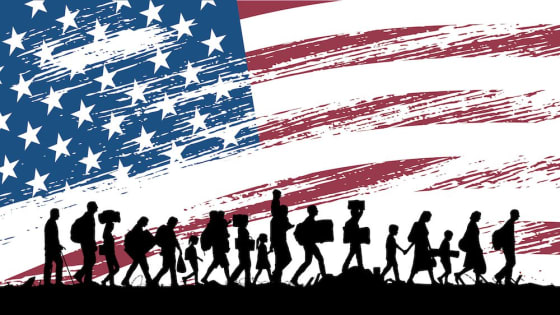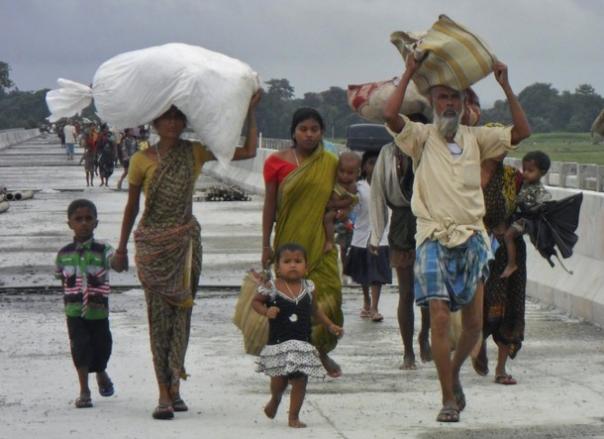This article is written by Sahil Aggarwal, currently pursuing B.A.LLB. (Hons) from NALSAR University of Law, Hyderabad. This article provides the requirements of Section 214(b) of the Immigration and Nationality Act, the probable reasons for denial, and the possibility of re-application.
Table of Contents
Introduction
Section 214(b) of the Immigration and Nationality Act has been a really powerful tool in the USA’s visa law that grants the visa adjudicators the authority to presume that the vast majority of the applicants are ineligible and should be denied a visa. While it has been argued that the section itself is not problematic, however, its unbridled application is. The Counsel Officers that oversee these applications have to perform a large number of interviews in a setting that inevitably relies on their unconscious and conscious biases in order to keep the pace of work. Such pressure has amplified because of the policies of the present government in the USA that have increased its focus on reducing the overstay rates. In this article, thus, we explore the requirements for Section 214(b), the probable reasons for denial under it, and the possibility of re-application.
Immigration and Nationality Act
The Immigration and Nationality Act, (hereafter, INA) is a federal law of the United States that was enacted in 1952and forms the basic act of immigration. It has been amended many times since 1952 and contains many of the most important provisions of the immigration law of the country. Prior to the INA, there were a variety of different statutes in the USA which governed immigration law but were not consolidated in one location. The INA, 1952 kept many of the same immigration policies from earlier statues with some major changes. Racial restriction and gender discrimination were discarded through this Act. It enabled selective immigration by giving a quota preference to aliens with much-needed skills and relatives of U.S. citizens. As stated earlier, the original act got amended many times. The most substantive change was introduced with the Immigration and Nationality Act Amendments of 1965 (hereafter, INA, 1965). The INA 1965 amendments abolished the national origins quota system, that provided restrictions on the basis of national origin, race, or ancestry for the immigration to the U.S.A. Interestingly, no less than 134 bills concerning immigration, border security, and related issues were introduced in Congress as of May 2017.
About Section 214(b) of the INA
Section 214(b) of the INA deals with the presumption of the status of a non-immigrant for every alien until he establishes that he is entitled to a non-immigrant status under Section 101(a)(15) of the INA for the satisfaction of the consular officer at the time of the application for visa and for the satisfaction of immigration officers, at the time of application for admission in the country. However, Section 214(b) does not include the aliens described under subparagraph (L) or (V) of Section 101(a)(15) and other nonimmigrants described under any provision of Section 101(a)(15)(H)(i) of the INA except the sub-clause (b1) of the same.
In this regard, it is important to point out that Section 214 of the INA essentially deals with the admission of non-immigrants, providing regulations for entry of an alien in the USA as a non-immigrant, the presumption of an alien being an immigrant, and provisions for the petition by an importing employer.
Thereunder, as provided, Section 214(b) specifies the requirement for getting a status of non-immigrant. In that context, as we have seen, Section 101(a)(15) of the Act becomes important. It deals with the definition of the term ‘immigrant’ and provides that every alien person not listed under clauses of the same section, will be considered an immigrant. Section 214(b) exempts non-immigrants listed under section 101(a)(15)(L) which grants a non-immigrant status on the person previously employed continuously for one year by a firm or corporation or other legal entity, and who seek to enter the USA for temporarily in order to continue his service for the same employer. Section 214(b) also exempts aliens under Section 101(a)(15)(V) who are the beneficiary of a petition filed before the Attorney-General before December 21, 2000.
Additionally, Section 214(b) requires that the applicant qualify the visa and will act in accordance with its terms and conditions upon the arrival to the country. Moreover, there are certain requirements for evidence that needs to be attached to applications made, such as visa applicants under Section 101(a)(15)(B) need to show that they have a foreign residence that they have no intention of abandoning and the purpose of their visit is temporary for business or pleasure. Similarly, students visa applicants under Section 101(a)(15)(F) have an additional burden to show that they have the qualifications necessary for the visa for which they are applying. Some other evidence includes a stable job in the country of residence, ownership of the business or real estate, close family members, or any other evidence that ensures that they will return from the USA after some time.
Hence, the consular officer must be convinced mainly for three things, firstly, the applicant intends to return to his or her home country following a temporary stay in the USA; secondly, that applicant’s financial situation is such that he or she can afford the trip without having to seek unauthorized employment in the USA; thirdly, that the travel is for legitimate purposes permitted by the visa category that the applicant has applied for.
Section 214(b) is one of the most common tools used by the Consular officers for the purpose of revocation. Applicants refused nonimmigrant visas are given standard rejection letters stating that their application had been denied for certain reasons. Some of the major reasons for rejection can be listed as follows:
- Limited ties to home country – The individuals are denied applications because they have limited ties to their home country. For instance, the individuals who are young, unemployed, or have a low paying job in their home country, do not have familial relations like children, parents, or do not have property or assets.
- Interview problem – The interview plays a significant role in the application process for Visa in the USA. The applicant’s conduct during the interview, his/her honesty, and confidence in answering the questions put before them, his/her dress, reaction, facial expressions, hesitation in answering the questions; discrepancy in the answers given, and deviation (if any) from the information provided under the documents affect the applicant’s credibility and intentions for the eligibility for a visa.
- Inaccurate consular understanding of the facts or law – It is possible that the consular officers may commit a mistake during the review of the visa application. This is perhaps because they have limited time and resources or they may be deficient in the local language or are inadequately trained in the complex areas of law. They may also be mistaken about some facts, for instance, a consular inspector may have gone to the wrong address, and wrongly concluded that the company was liquidated while it was still running.
- Failure to meet the criteria required for the issuance of work visa – Temporary employment visas are deemed technical, thus it is probable that the applicant may fail to meet the requirements and get his or her application rejected.
- Overstay profile or from a home country to which many do not return home – If the applicant’s profile matches the validation studies that tend to show overstayed visas, the applications may get rejected. US Government statistics now track the percentage of visa holders who overstay their visas and do not return to their home country. If the pattern suggests overstay or asylum from the previous applicants of a certain country, consular officers may deny visa application under Section 214(b).
- The general economic and political situation in the home country – The general economic and social conditions of the country are poor or show civil discontent or unstable political condition, which may also affect the number of visa refusals under Section 214(b).
- Numerous, long-term visits to the USA – The consular officer may reject the application of the applicant who is no longer residing in his home country or maybe engaging in unauthorized employment in the USA. In case, an applicant had previously extended his stay and then applied for a short planned visit in the subsequent application, it may affect the credibility of the applicant.
- Student-specific problems – Consular officers often deny students’ applications because of a planned enrollment in a community college or a ‘non-brand name’ university; lack of adult-like economic ties to their home country; a perceived poor track record while in the US.
- Other relatives who previously emigrated – The applicants with relatives in the US may be denied for reasons such as, the fact that an individual has a close relative in the country can be given a negative consideration because it would be easier for the applicant to settle in the US, or if the relative has obtained status in an objectionable manner to the consular officer, it affects the credibility of the applicant too.
- Pending or previously denied immigrant petition/application – The previous rejection of the application may also affect the decision of the consular officer.
- Fraud – A consular officer may have a strong suspicion that a document filed is fraudulent.
- Guilt by association – An officer may deny the application of an individual in a group whose members have been shown to be involved in misdeeds.
It has been observed that Section 214(b) of the INA is truly an elastic provision such that it may be invoked in multiple situations. However, these reasons are not exhaustive, moreover, some of them may not even be a rational basis for the denial of an application. However, it is dependent upon the consular officers to grant permission. This does not mean that their decisions might not be challenged, however, for our purposes, these things provide guidelines that are needed to be kept in mind while filing applications.
Re-application after the denial under Section 214(b)
Any denial issued by the consular officer under Section 214(b) is not a permanent one. The consular officer will reconsider a case if the applicant presents further convincing evidence of ties outside the USA and dismisses any reason for which his or her application was denied. However, once an officer has determined that an applicant may not qualify for a visa, the applicant should not reply unless there are significant changes in the applicant’s circumstances or information. Moreover, in some cases, the denial may remain intact, no matter how many times the applicant has tried.
Requesting an advisory opinion
If an applicant’s visa denial is based on the reasons based on the question of law, they can request an advisory opinion from the Department of State’s Visa Office in Washington D.C. The Visa Office does not review the claims that the consular officer made a mistake of fact. The Visa Office through its email channel, LegalNet ([email protected]), may provide a case-specific response on the interpretation or application of immigration law. The substantive response by the Visa Office will be a summary of the advisory opinion forwarded to the consulate. The opinions on interpretations and applications are binding on consular officers, but consular officers have the sole authority to apply the law to the facts.
Conclusion
The USA attracts millions of immigrants per year, maybe for reasons such as medical treatment, study, simple tourism, or anything else. And for that, the applicants are required to go through the process of immigration laws laid down by the USA. This process has its own fallouts, sometimes it also leads to the criticism of the Council officers and related authorities. However, this is not to deny the impact of government policies in the process. But it becomes important for an applicant to abide by the rules and regulations laid down and for that purpose, it is desirable that the applicants take guidance from advisory authorities to go through the process as smoothly as possible.
References
[1] https://rsa.tandfonline.com/doi/abs/10.1080/17450101.2019.1567986
[2] https://book4you.org/book/2626211/4ded28
LawSikho has created a telegram group for exchanging legal knowledge, referrals and various opportunities. You can click on this link and join:
 Serato DJ Crack 2025Serato DJ PRO Crack
Serato DJ Crack 2025Serato DJ PRO Crack










 Allow notifications
Allow notifications


